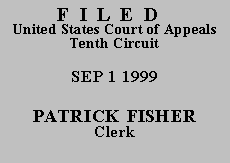

| BOLA AJIWOJU,
Plaintiff-Appellant,
v.
CAROL MARINOVICH, Mayor,
Representative to Wyandotte County Defendant-Appellee. |
No. 99-3101
(D.C. No. 98-2573-GTV) (Kansas) |
Bola Ajiwoju appeals the district court's orders (1) granting dismissal for failure to state a claim against defendant Carol Marinovich in her capacity as Mayor/CEO of the Unified Government of Wyandotte County (hereinafter Unified Government) and (2) denying his motion to reinstate Wyandotte County District Judge George A. Groneman as a defendant. We affirm.
Mr. Ajiwoju filed suit against his former employer, the Housing Authority of Kansas City, Kansas, in the district court of Wyandotte County, Kansas, claiming breach of contract, retaliatory and discriminatory discharge, and violation of 42 U.S.C. § 1981. In a memorandum decision, Wyandotte County District Judge George A. Groneman granted the Housing Authority's motion for summary judgment on all the claims. The Kansas Court of Appeals dismissed Mr. Ajiwoju's appeal.
Mr. Ajiwoju then filed suit in the United States District Court for the Western District of Missouri, naming as defendants Judge Groneman and Carol Marinovich in her capacity as Mayor/CEO of the Unified Government of Wyandotte County. The court held that Judge Groneman was entitled to judicial immunity and dismissed him from the suit. The court then held that venue was improper and transferred the case to the District of Kansas.
The district court in Kansas refused to reinstate Judge Groneman as a defendant, citing judicial immunity. The court dismissed the remaining claim against the Unified Government after finding that Mr. Ajiwoju failed to plead any basis for assessing liability against that entity.
On appeal, Mr. Ajiwoju contends that judicial immunity cannot protect Judge Groneman because his grant of summary judgment in favor of the defendants was entered in bad faith as part of a conspiracy to deprive Mr. Ajiwoju of relief. Judicial immunity is an absolute immunity from civil damages liability for acts performed in a judge's judicial capacity. See Mireles v. Waco, 502 U.S. 9, 11 (1991) (per curiam). "[J]udicial immunity is not overcome by allegations of bad faith or malice." Id.; see also Harris v. Champion, 51 F.3d 901, 906 (10th Cir. 1995) (immunity for allegations of excessive conduct). Because Judge Groneman's order constituted a judicial act, the district court properly invoked absolute immunity in refusing to reinstate a claim against him.
Mr. Ajiwoju also appeals the dismissal of his complaint for failure to state a claim pursuant to Fed.R.Civ.P 12(b)(6). We review de novo a dismissal for failure to state a claim. See Kidd v. Taos Ski Valley, Inc., 88 F.3d 848, 854 (10th Cir.1996). Although we must construe a pro se plaintiff's complaint liberally, we do not accept as true those allegations that are conclusory or fanciful in nature. See Hall v. Bellmon, 935 F.2d 1106, 1110 (10th Cir.1991).
Mr. Ajiwoju first argues that liability can be assessed against the Unified Government because it is vicariously liable for Judge Groneman. Under Kansas law, "[v]icarious liability depends upon the relationship of the parties, such as employer and employee or principal and agent." St. Paul Fire & Marine Ins. Co. v. Tyler, 974 P.2d 611, 615 (Kan.Ct.App. 1999). Whether an agency relationship exists turns on the degree of power and control the principal exerts over the agent. See Major v. Castlegate Inc., 935 P.2d 225, 228 (Kan.Ct.App. 1997) (agency relationship in respondeat superior context); McDonnell v. The Music Stand, Inc., 886 P.2d 895, 898, 899 (Kan.Ct.App. 1994) (vicarious liability).
As a state district court judge, Judge Groneman was employed and compensated by the State of Kansas, not by the local government. See Kan. Stat. Ann. 75-3120g (1997). The fact the Unified Government provided quarters for holding court, see Kan. Stat. Ann. 20-613a (1995), does not give it control over the decisions of the court. Because the Unified Government had no meaningful control, power or responsibility over Judge Groneman, it cannot be held vicariously liable for his decisions.
Next, Mr. Ajiwoju asserts the Unified Government is liable for conduct of the Housing Authority. Kansas law, however, clearly states that the Housing Authority is a separate suable entity. Kan. Stat. Ann. 17-2340 (1995) ("Such housing authority shall have the power to sue and be sued.") Mr. Ajiwoju points to no evidence to the contrary. Because Mr. Ajiwoju fails to state a legal theory
on which to base a claim against the Unified Government, his complaint was properly dismissed.
We AFFIRM the judgment of the district court.
ENTERED FOR THE COURT
Stephanie K. Seymour
Chief Judge
*.This order and judgment is not binding precedent, except under the doctrines of law of the case, res judicata, or collateral estoppel. The court generally disfavors the citation of orders and judgments; nevertheless, an order and judgment may be cited under the terms and conditions of 10th Cir. R. 36.3.